This ecologically conscious family film tells the heartwarming true story of an unlikely bond formed between a fisherman and a wayward penguin – a bond that would transcend borders, both physical and metaphorical.
My Penguin Friend movie follows the real-life account of João, a simple yet solitary man living in coastal Brazil who rescues an injured Magellanic penguin after a chance encounter in the waters off Ilha Grande. Named “DinDim” by one of the local children, this intrepid bird would proceed to develop a deep affinity for João, returning annually across thousands of miles of open ocean just to spend time in his company.
Director David Schurmann spins this tale of interspecies compassion with a keen eye towards authenticity, opting to feature live penguin performers over digital alternatives. While clearly aimed at younger viewers, the film casts its net wider by subtly weaving in environmentalist undercurrents around overfishing, oil spills, and climate change.
Perhaps most profoundly, however, it offers moving commentary on human solitude and our shared capacity for forging bonds in even the unlikeliest of relationships, across lines that superficially may divide us. (Just as João found solace in DinDim, so film critics might take refuge in the simple pleasures of family fare amid life’s daily stresses.)
Of Loss, Love, and the Unexpected Bonds Between Species
My Penguin Friend movie tells the tale of João, an aging fisherman whose life was forever altered by tragedy on the high seas. Years after losing his cherished son Miguel to the tumultuous tides of Brazil’s Ilha Grande coastline, João (Jean Reno delivering a heart-wrenchingly stoic turn) continues to drift aimlessly through each passing day, deadened to the myriad joys life continues to offer ashore.
Enter DinDim—a plucky penguin quite literally washed ashore after becoming marooned from his Antarctic brethren, his puffy plumage soaked through with crude oil spilled from some nameless trawler.
Spotting the pitiful piscine prototype floundering in the surf, João’s dormant paternal instincts are rekindled, driving him to rescue and rehabilitate the bedraggled bird. What begins as a mere act of human decency soon blossoms into an unlikely interspecies bromance that reawakens João’s spark.
As the steadfast Maria (Adriana Barraza, reliably sublime) looks on with apprehension eventually giving way to acceptance, DinDim inserts new verve into their lives—even if his nesting instincts do lead to more than a few flush-worthy faux pas around their casa.
Of course, like any good buddy flick, hardship soon strikes to test the unlikeliest of friendships. But through it all, DinDim’s resilience and loyalty rekindles in João the will to weather further woes. Some have critiqued Schurmann’s perhaps too sentimental scripting of their bond, but for this critic, Reno and feathered co-star Fernando truly earn their chemisty.
At its best, My Penguin Friend captures life’s ephemeral beauty found in even the most improbable of places, reminding us that hope and joy may emerge however and whenever we remain open to fate’s surprises.
The Soulful Nuances of Species Spanning Grief
Within My Penguin Friend’s deceptively simple charms lies a treasure trove of emotionally cogent performances. Chief among them is Jean Reno’s soul-baring turn as João, the gruff fisherman whose briny vessel has long run aground on a turbulent sea of sorrow.
With nary a word nor tell, Reno embodies the role with a gravitas reminiscent of De Niro’s taciturn rage in Cape Fear. Between weighted silences, his haunted eyes tell an epic saga of pain, whose scars only begin to heal with the arrival of an unexpected friendship.
No stranger to brooding machismo roles from Léon to Ronin, Reno strips away bravado to expose raw vulnerability. Shattering genre constraints, he brings nuanced humanity to a role that lesser talents would reduce to cliché. Like Tony Soprano seeking cure in furry “therapy,” João finds lightness of being where least expected – through an unconventional bond defying man’s myopic definitions of kin. If awards had integrity, Reno’s immersive soul-baring would garner top honors.
As stalwart Maria, the film’s emotional bedrock, Barraza anchors the household with her signature blend of grit, grace and empathy. Where João drowns private anguish in solitary rhythm, Maria’s fortitude stems from nurturing communal threads. In her, Schurmann locates feminist currents rippling against dominant relationship archetypes found ad nauseum from Six Feet Under to The Walking Dead. Ultimately, their marriage testifies that faith shaped through fire need not forge brittle shells, but tempered steel.
Aiding their transformational journeys, ten stoic penguins portray DinDim with instinctual wisdom beyond their years – or taxonomic order. Unlike antics depicted by most “cuteness porn” family fare from Babe to Finding Nemo, these avians offer audiences life lessons through dignified example rather than pandering manipulation. Solemn in solemn duty yet buoyant in profound essence, DinDim acts as more than plot device: spiritual guide.
If awards consider criteria beyond publicity machines, Reno, Barraza and feathered thespians merit top honors for performances resonating long after closing credits. Schurmann’s cast elevates simple material to poignantly probe life’s bittersweet mysteries – man, bird, or beast.
Shocking Shots of Feathered Fortitude
From its soaring opening shots of penguins cutting through cerulean seas to its intimate moments peering through tufted eyes, My Penguin Friend epitomizes Schurmann’s adept blending of art and craft. Unlike gimmicky found footage flicks or slick CGI spectacles, Schurmann favors practical magic over post-production parlor tricks. Witnessing ten actual avians portraying DinDim showcases a stuntcasting tour de force to rival Daniel Day-Lewis’ immersive commitments.
Backed by cinematographer Anthony Dod Mantle, Schurmann peers into privacies seldom seen, wielding shallow focus like Scorsese keenly capturing the textures of lived worlds within meticulously framed vignettes. One tracking shot following our hero to terra firma perfectly captures the pluck required for terrestrial travel.
Elsewhere, wide establishing shots showcase Brazil and Argentina’s natural splendor in vibrant hues evoking Lawrence of Arabia. These sequences elevate the film beyond mere “cuteness porn” into rhapsodies celebrating life’s enduring beauty.
Schurmann’s vérité methods lend authenticity to even far-fetched moments like Miguel’s ghost haunting sun-dappled rooms. Throughout, he maintains reverence for non-human stars without resorting to mawkish anthropomorphism – no small feat in a genre rife with Animalympics-level caricatures. For fans of nature documentaries and vérité world-building alike, Schurmann’s assured direction makes My Penguin Friend’s flight well worth taking.
Touching The Tides of Time
Within My Penguin Friend’s unassuming charms lies a trove of emotionally impactful themes. Chief among them is the exploration of grief – that endless sea swelling within João, threatening to engulf all shores of joy in an undertow of sorrow. With empathy worthy of Bergman, Schurmann maps the fragmented archipelago of a man adrift, only to slowly rebuild fragmented lands through the unlikely buoyancy of an winsome waddler.
Rarely has this critic encountered a film so adept at mining poignancy from life’s bittersweet intersections. Like Maria counseling João from her sturdy isle, the film illustrates grief’s capacious ebbs shaped through communal anchoring. DinDim offers the simplest of life preservers – compassion without precondition – instilling hope that salvation may emerge from even life’s most unforeseen currents.
Some bemoan DinDim’s failure to evolve into dizzying cetacean theatrics seen in marine leviathans like The Cove or Blackfish. But subtlety stems Schurmann’s power – that healing transpires through quiet reverence, not shock tactics. My Penguin Friend reminds that even ripples leave enduring impact, signaling possibility that peace may yet prevail if we open our islands and hearts to life’s surprises.
The film’s environmental ethos flows naturally from this mission. Nature comprises not backdrop, but mirror – her beauty a balm reflecting our capacity for uncommon grace. Ultimately, My Penguin Friend navigates loss and love with grace befitting Scorsese, subtly shifting cultural tides with a future in its wake.
Waddling the Walk of Life
Beyond storytelling charms, My Penguin Friend demonstrates Schurmann’s assured technical mastery. Fernando Velázquez’ score glides subtly, never showboating mawkish crescendos like the overwrought string-fests marring lesser fare from Free Willy to Babe. With nary a musical mollycoddle to manipulate us, pathos emerges authentically from image and soul alone.
Praise likewise for Dod Mantle’s sun-spattered cinematography, treading tides between vérité intimacy and sweeping vistas befitting Lawrence of Arabia. Herein lies a filmmaker refusing gimmicks while bringing audiences near enough to sense penguin down mingling amid feathers. Opting for ten true avians over fabricated fakes, Schurmann offers a refreshing change of pace from most CGI messes plopping plasticity over profundity.
Perhaps pace alone shows room for tightening, as biologists’ B-plot bogs momentum. Yet Schurmann trusts his vision, declining contrived drama’s quick fixes for meaning. My Penguin Friend reminds that life’s rhythms rise and fall not to Hollywood’s drum, but nature’s. For fans of Scorsese’s longueurs allowing humanity to breathe between beats, Schurmann’s patient hand pays poignant dividends.
A Gentle Ripple in the Sea of Family Cinema
While My Penguin Friend may lack polish around the edges, at its core resonates a heart that, like its animal stars, marches to the beat of singular drum. Schurmann favors emotional authenticity over technical fireworks, crafting a work embracing life’s variegated textures. Unlike glossier fare that leans crassly manipulative, here pathos emerges gradual and genuine as sunlight dappling waves.
For this critic, the film strikes chords akin Soderbergh’s Traffic in affirming hope may emerge wherever two worlds intersect, however unlikely the pairing. Though boasting simplistic plots, works finding poignancy in life’s small surprises often resonate longest. Where operatic spectacles numbing the senses fail, intimacy fostering reflection endures.
Ultimately, My Penguin Friend reminds that while time erases all outward marks, memories need not imprison but propel us toward new horizons. As nature’s players teach through example rather than sermon, simplicity and authenticity often nurture understanding better than artifice.
For open-minded viewers, Schurmann’s subtly impactful film deserves appreciation if not exactly accolades. Most importantly, it leaves hearts a degree warmer – and for now, in troubled waters, is there not healing enough in that?
The Review
My Penguin Friend
My Penguin Friend offers a heartwarming true story with charming performances, though some uneven elements keep it from soaring to its full potential. Ultimately however, Schurmann's film reminds us of the powerful yet simple acts of compassion that can foster healing in even the most broken of souls. For gracefully highlighting life's redemptive surprises found in unlikely places, My Penguin Friend gets a rating of 7/10 from me.
PROS
- Heartwarming true story and compelling exploration of grief, healing, and unexpected friendships
- Stunning natural scenery and evocative cinematography
- Strong performances from Jean Reno and Adriana Barraza
- Authentic penguin scenes and incorporation of environmental themes
- Feel-good family entertainment with universal messages
CONS
- Predictable animal-befriends-human storyline
- Reno's casting as Brazilian fisherman feels mismatched
- Patagonia subplot bloats runtime without adding much value
- Uneven tonal shifts between drama and lightheartedness









































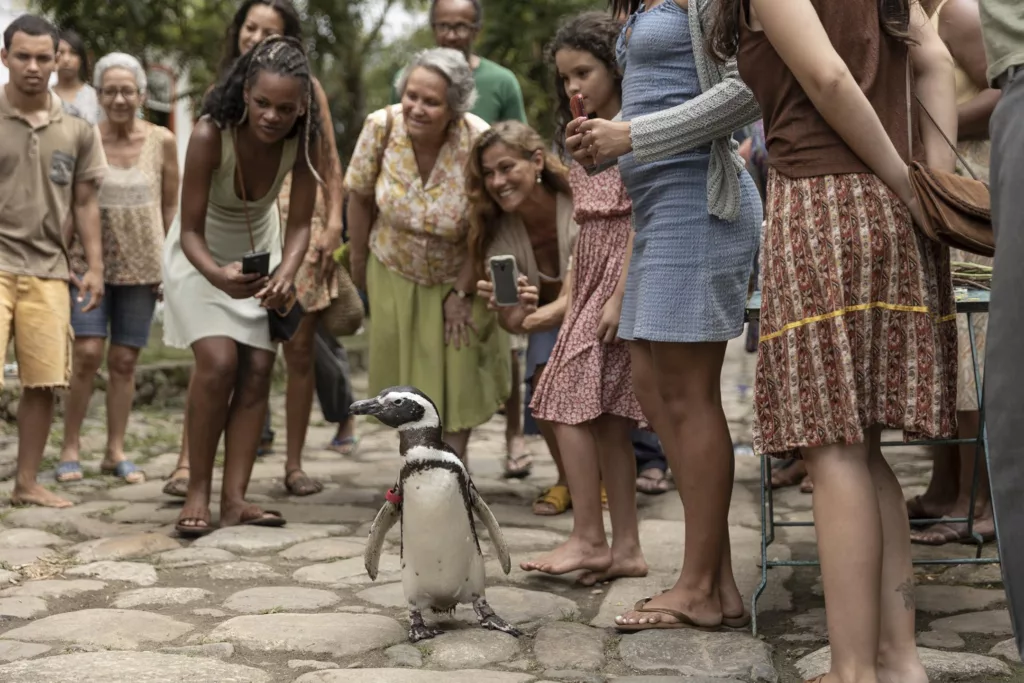
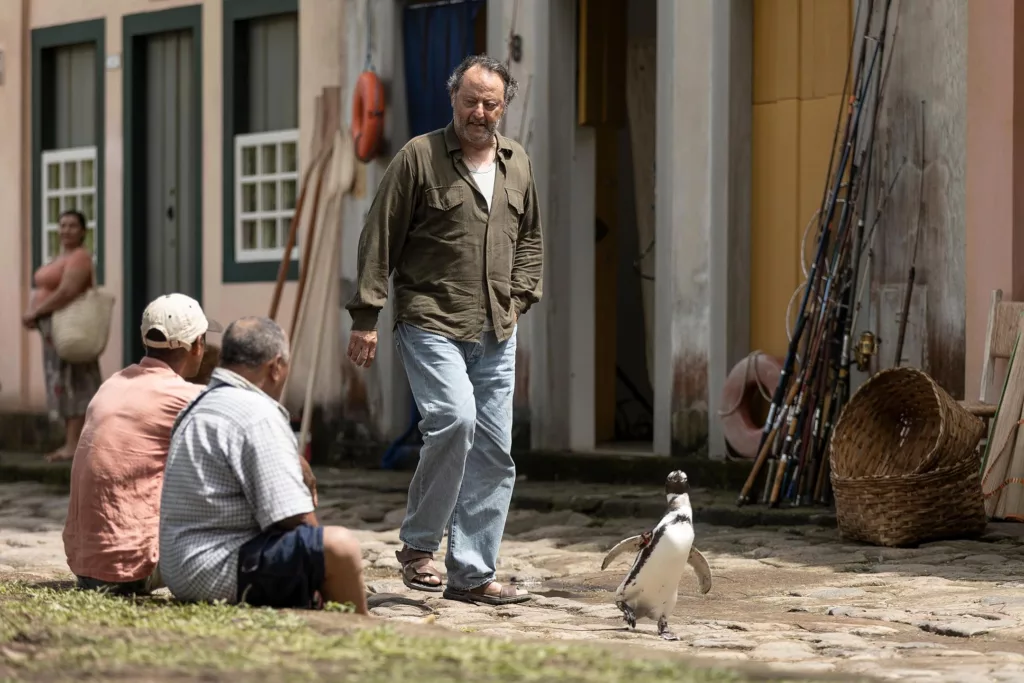
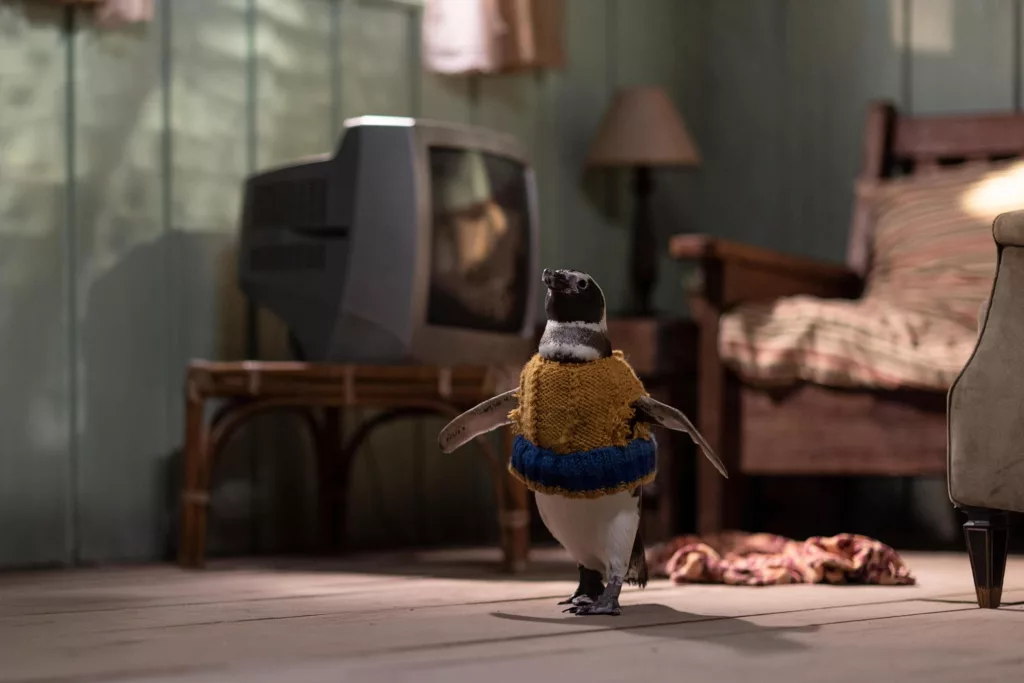
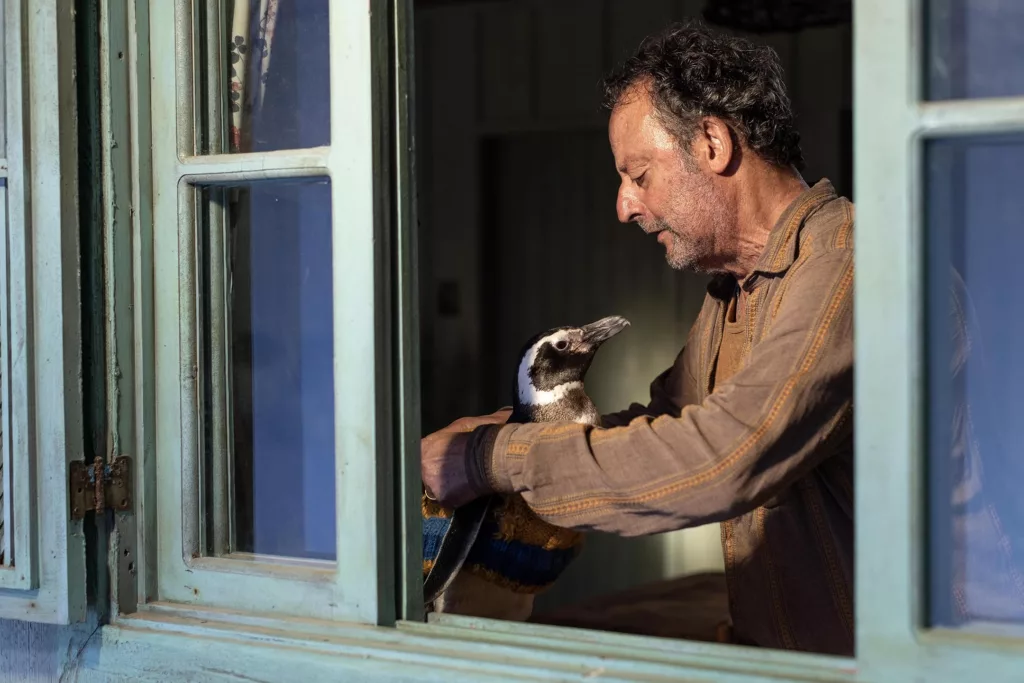
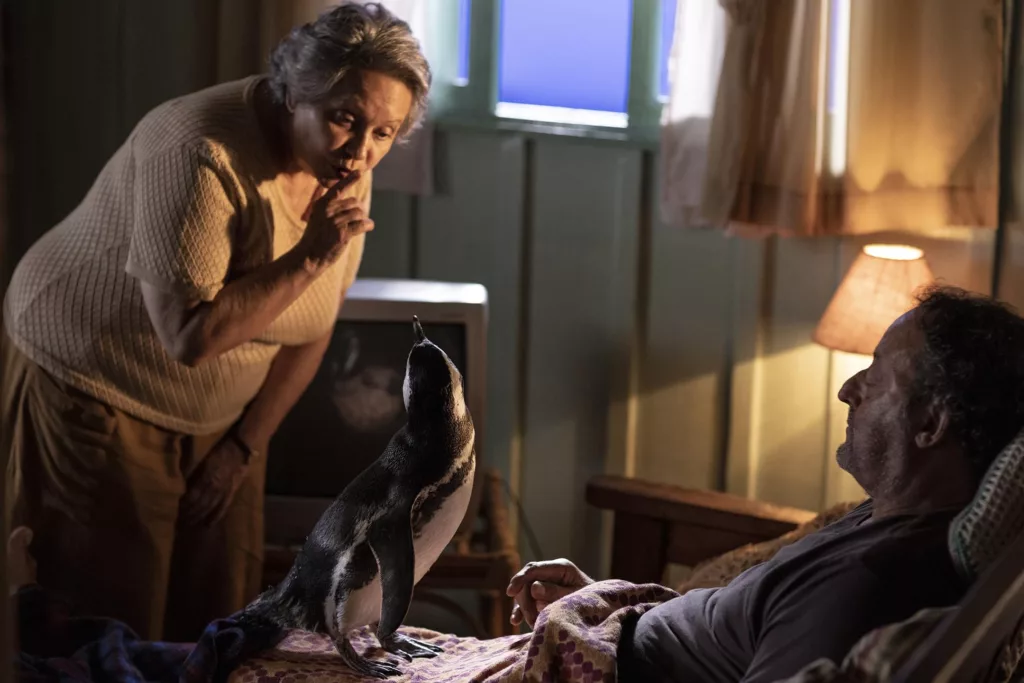








Discussion about this post